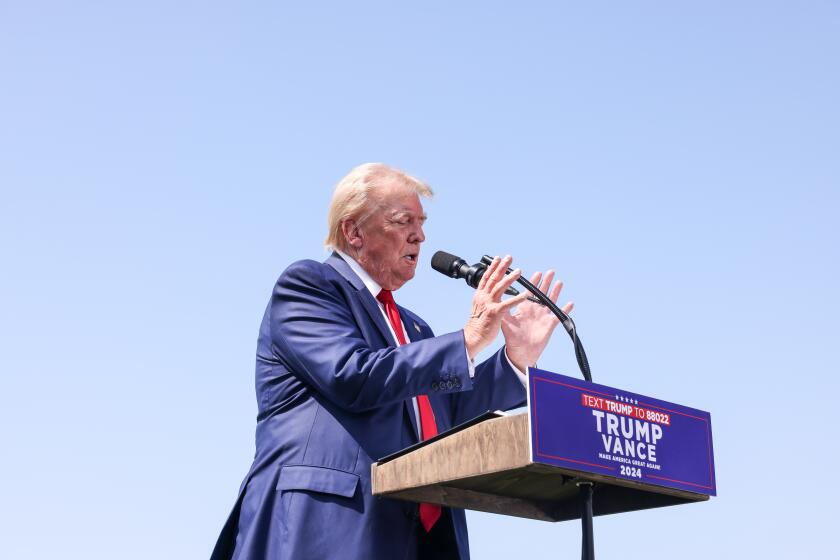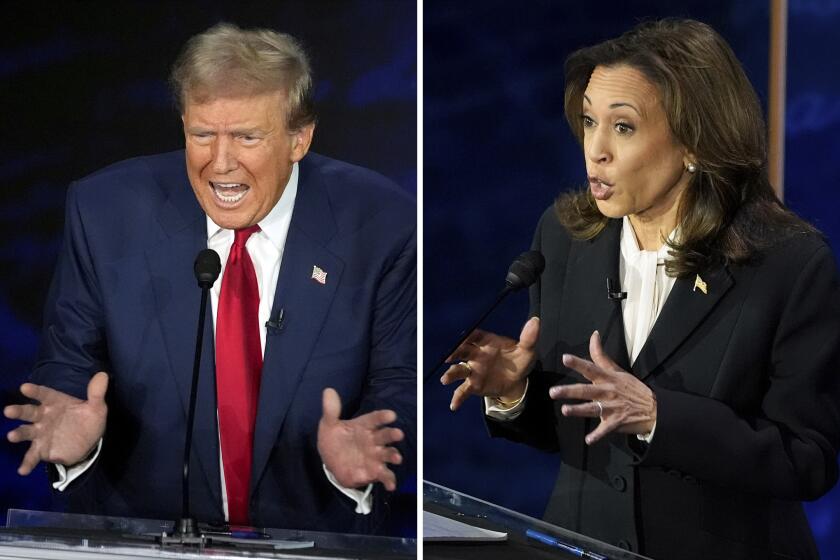Court to Reconsider Repeal of Term Limits
A federal appeals court Tuesday agreed to reconsider an opinion issued last month that overturned California’s term limits for legislators.
The U.S. 9th Circuit Court of Appeals voted to put the politically charged issue, previously decided by a three-judge panel in a 2-1 vote, before a special 11-judge panel and speed the process leading to a decision.
It was not apparent from Tuesday’s order how many judges voted to reconsider the decision. Under the court’s rules, 10 of the 18 full-time judges needed to approve the so-called en banc review.
The court left term limits in place, at least until the larger panel decides the issue.
“As long as a stay is kept in effect, term limits is still the law. That has been our goal,” said Secretary of State Bill Jones, the state’s top elections officer and chief defender of term limits.
The decision to rehear the case does not mean that the court will reverse positions and uphold California’s term limits law. The 11 judges could strike down the law for reasons other than those cited by the three-judge panel in its Oct. 7 decision.
“I don’t think you can say based on this order that they’re going to uphold term limits,” said Deborah J. La Fetra of the Pacific Legal Foundation, which is helping defend term limits. “What it does say is that the [Oct. 7] opinion was wholly unacceptable to a majority of the court.”
California’s term limit law holds Assembly members to three two-year terms, and senators to two four-year terms. The measure extends to other statewide officeholders such as the governor, limiting them to two four-year terms, although those restrictions are not facing a court challenge.
In a surprising decision, the three-judge panel concluded last month that the 1990 term limits initiative was unconstitutional. It said the state failed to inform voters explicitly in an analysis of the initiative that once veteran lawmakers were forced from office, they could never again run for that office.
“Absent adequate notice,” the panel ruled, “we cannot hold that the people intended severely to burden their most fundamental right, the right to vote. In matters this important, the state simply must tell its citizens what they are voting on.”
Term limit supporters and some foes attacked that decision, arguing that such reasoning could apply to virtually any initiative. In his appeal, Jones maintained that the three-judge panel’s ruling violated Californians’ rights to govern their own affairs.
Based on Tuesday’s order, the larger group of judges could decide the case by year’s end, something both sides want. In its one-paragraph announcement, the court ordered attorneys to appear in San Francisco to argue the case on Nov. 20. A decision could be issued any time after that.
Failure to decide the case quickly would further muddle next year’s elections, already complicated by separate pending federal challenges to a new campaign finance law and a new open primary system approved by voters last year.
Incumbents have until February to decide whether they are seeking their old seats. Whichever side loses the term limits case is expected to appeal to the U.S. Supreme Court, which means that the uncertainty will spill into next year.
A final decision would shape California’s political landscape next year, determining the fate of 27 state lawmakers who would be forced from office in 1998 because of term limits. In a ripple effect, the decision would help decide the lineup of candidates vying for several statewide offices.
The list of lawmakers who stand to be “termed out” includes the Legislature’s two leaders, Senate President Pro Tem Bill Lockyer (D-Hayward) and Assembly Speaker Cruz Bustamante (D-Fresno).
If term limits are upheld, Lockyer, for one, says he may run for the Democratic nomination for state attorney general in a race that would pit him against fellow termed-out Sen. Charles M. Calderon (D-Whittier).
Attorney Joe Remcho, representing Democratic lawmakers challenging the 1990 initiative, said that as the full court becomes “more familiar with the issue, we’re confident . . . they’ll conclude that these term limits are far in excess of what is constitutionally permissible.”
The case stems from a lawsuit filed in 1995 by current and former Democratic lawmakers, along with voters who support them, contending that the 1990 initiative is unconstitutional because it bans termed-out legislators for life from seeking their old seats.
More to Read
Get the L.A. Times Politics newsletter
Deeply reported insights into legislation, politics and policy from Sacramento, Washington and beyond. In your inbox three times per week.
You may occasionally receive promotional content from the Los Angeles Times.










